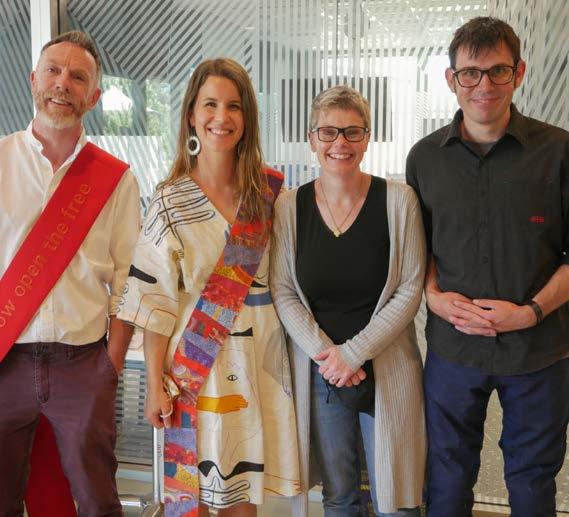
4 minute read
Both our witness and our gift
by Rev Jesse Size
I remember the first time the Uniting Church really caught my attention. We had recently moved to Port Augusta and I remember reading an ABC news article1 about how members of the 13th Assembly had chosen to interrupt normal programming by walking to Parliament House in a public act of worship, solidarity and lament.
The Assembly had been listening to the stories of harm and exclusion caused by the Federal Government’s ‘Stronger Futures’ legislation. Andrew Dutney wrote about how the First Peoples are not them, they are us. He spoke about the improbable, uncomfortable, but wonderful recognition that we are one body in Christ and that if one member suffers, we suffer together (1 Corinthians 12:26).
The accompanying photograph was taken after Chelsea’s ordination service. It features Rev Olly Ponsonby (Deacon), Rev Chelsea Size (Deacon), Mandy Harvey (Deacon candidate) and Rob Cartridge (Deacon candidate).
Chelsea and I would have a wonderful opportunity to walk alongside and learn from First Peoples in Port Augusta. Members of the Port Augusta Uniting Aboriginal Islander Christian Congress (UAICC) church would become family to us over time. Our kids grew up in a sea of aunties, uncles, poppas and nannas. Our Congress family would model for us ways of walking gently on the land. They would show us ways of remembering, ways of healing, and ways of honouring deep bonds of togetherness in community. We would also feel the ache of broken relationships between First and Second People’s, between hosts and guests. Our Revised Preamble to the Constitution is honest about how Second Peoples have often failed to be good guests while also calling us into the types of relationships that ultimately reflect the vision of the Basis of Union. This vision of reconciliation and renewal for the whole creation has always inspired me and emboldened me. An embodiment of that from further afield is the Corrymeela community, a peace and reconciliation organisation in Northern Ireland. Corrymeela literally means, ‘the place of the lumpy crossing.’ Peace and reconciliation is a bumpy, uncomfortable road. We are called to wage peace with another. Togetherness in community is always hard won because we are different and because we are human, but it is also possible because we are in Christ and because we are ultimately one body. When we talk about reconciliation and renewal we’re talking about destiny together and we’re also pointing to the ultimate truth of our profoundly interconnected lives. We are, as Archbishop Desmond Tutu and Rev Mpho Tutu wrote, ‘sisters and brothers, whether we like or not.’2
I know many in the Uniting Church feel tired from the hard conversations we’ve had together along the way. The Uniting Church is one of those lumpy crossing places. I can understand how this could easily become a problem story but maybe in other ways it’s a hopeful story that captures something of our real charisma and vocation together.
... the work of making the church a safe place for all people is more than compliance, more than meeting our duty of care, it is about living out Jesus’ vision of the coming reign of God.
What if renewal is what happens on the other side of reconciliation? Perhaps before us, if we're brave enough and trust Christ to guide us, is the opportunity to really learn the ways of reconciliation and renewal, ‘the things that make for peace’ (Luke 19:42). In a world that includes much division and struggle perhaps this shall increasingly become both our witness and our gift to the world.
1 https://www.abc.net.au/religion/the-first-peoples-are-us-why-theuniting-church-opposes-stronger/10100398 2 Archbishop Desmond Tutu and Rev Mpho Tutu, The Book of Forgiving: The Fourfold Path for Healing Ourselves and Our World (William Collins, 2014), p.19.
Ordination of Rev Chelsea Size (Deacon)
In late November, 2021, Rev Chelsea Size was ordained as a Deacon in the Uniting Church. The service, coordinated through the Wimala Presbytery, was held at the Para Hills Community Hub, which was appropriate for her call to minister as a deacon to those in the community. Chelsea believes that the marginal communities she and her husband Jesse have been involved with, have formed them, just as much as the theological formation at Uniting College. Being in ministry with the Uniting Aboriginal and Islander Christian Congress Church in Port Augusta and then Training and Formation Coordinator with United Aboriginal and Island Christian Congress (UAICC) in South Australia has left a lasting impact. What Chelsea has found is that a young female ordained person is a surprise for many. She has always felt a responsibility to represent her faith community positively, but this is now greater. The ordination means that her ‘call is affirmed back’ and that her life proclaims that she is ‘caught up in a different narrative and story.’ People now see her through another lens, but this carries an opportunity for enriching conversations about spirituality and people’s experience of church. She has found that being a deacon invites ‘a very specific kind of presence: non-anxious, non-defensive, compassionate and curious.’









